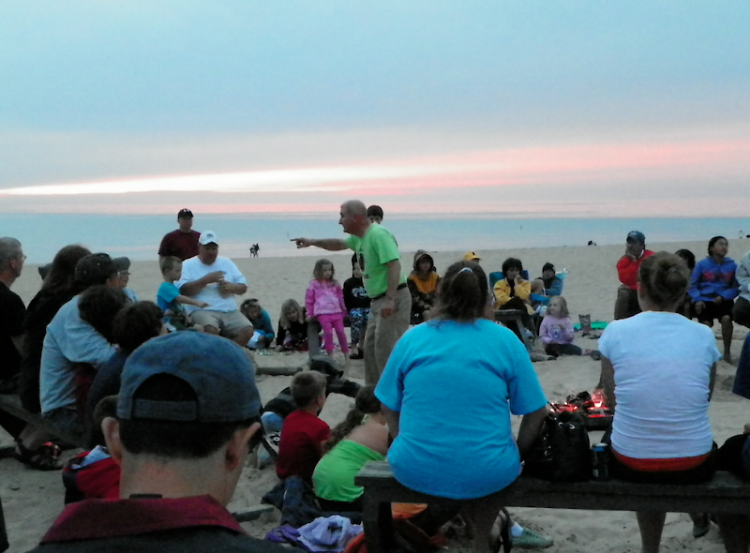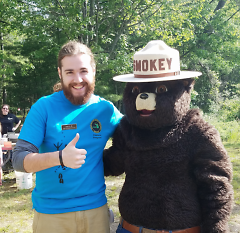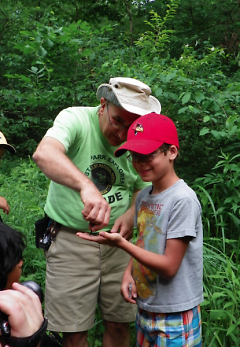This year the State Park Explorer Program will conduct three “themed” weeks and one special summer long program.
Under the clear night’s sky, campers from Warren Dunes State Park gather on the shores of Lake Michigan. Above the stars glisten, below Mike Latus hosts his “Sky Watch” program.
“I have several volunteers to help me aim our three telescopes. We often get one hundred people at these programs,” said Latus of his astronomy program.
For most students, school is out, but that does not mean learning has to stop.
People of all ages have the opportunity to participate in a variety of outdoor learning activities taking place at state parks and recreation areas across Michigan this summer. Topics cover anything from black bears to astronomy and everything in between.
“It’s a great way to get kids involved in experiencing nature in a unique way that doesn’t make them feel like they’re stuck in a science classroom,” said Devin Burke, a five-year veteran explorer guide from Young State Park.
The State Park Explorer Program, headed by the Michigan Department of Natural Resources, was introduced in 2004 to educate and entertain state park visitors through hands-on learning activities. Now more than 40 state parks and recreation areas participate in the program during the summer months.
Summer statewide programs
One of the favorites for explorer guides and participants alike is the Hook, Line and Sinker program.
This program takes place at over 25 state parks from early June through the month of August. It teaches participants the fundamentals of fishing such as setting up your fishing pole, casting, using bait and removing fish from the hook. Parks can provide a rod and reel, but people are welcome to bring their own. Program participants under 17 do not need a fishing license. This educational program is free with purchase of a Recreation Passport.
“The theme weeks started as a way to generate interest and market the programs in the parks by having a consistent theme statewide for the week,” said State Park Explorer Program coordinator Karen Gourlay. “It was also another way to connect staff to each other since there is usually only one explorer guide in each park, and they don’t often get the opportunity to collaborate since they are many miles apart.”
July 11-17 will mark the fourth annual Michigan Mammals Week. Introduced in July 2013, this was the State Park Explorer Program’s first themed weekend. It will celebrate the great diversity of mammal species that call Michigan home.
Special events and activities will take place across the state, including at these state parks and recreation areas in Greater Grand Rapids area:
- Muskegon State Park, North Muskegon, 231-744-3480
- Van Buren State Park, South Haven, 269-637-2788
- Yankee Springs Recreation Area, Middleville, 269-795-9081
- Mears State Park, Pentwater, 231-869-2051
Last year, STOP the Invasives Week was added in August, and it will continue this year. Invasive species are a tremendous threat to Michigan’s biodiversity because they often compete with or overtake native species’ food and habitat. From Aug. 1-7, participants can partake in many different activities across 17 different state parks to learn more about invasive species, how to identify them and what people can do to “stop the invasives.”
Feathered Friends Weekend was added this year in June to mark the 100th anniversary of the signing of the Migratory Bird Treaty Act, which provided federal protection for bird species.
State parks celebrated by offering bird-themed programs. Campers at Warren Dunes State Park, for example, participated by observing birds in their natural habitat. They also learned different birdcalls, bird anatomy and bird behaviors such as migration patterns.
Visitors at Young State Park participated in a bird identification activity called “Bird Brained.” Burke created human-sized bird parts especially for the weekend. This gave campers the chance to “become” a bird.
Growing in numbers
Gourlay has been with the Explorer Program since its inception.
“This program has grown quite a bit,” she said. “A few locations have been added or changed over the years, but overall participation has dramatically increased since the start.”
In 2015, explorer guides offered over 3,800 scheduled programs that were attended by approximately 71,600 participants. In addition, the guides frequently walk the parks, offering educational messages to park guests. An estimated 121,000 people participated in this way.
“An average year brings about 3,200 people. Last year was a record breaker. We had over 5,000 people attend programs,” said Latus of participation at Warren Dunes State Park.
Latus is a 22-year veteran with Warren Dunes State Park. He began working for the park in 1994 with a program run by the Kalamazoo Nature Center. He remained with the park when it became the State Park Explorer Program.
There are 42 explorer guides working at 52 different parks during the summer. They are often from a variety of backgrounds and walks of life. Latus has been a high school math and science teacher for 32 years.
This summer, explorer guides range in age from 18 to 70. Many of them are college students, teachers or retirees. The program gives college students the chance to explore potential careers in natural resources or education. For instance, Burke is currently pursuing his bachelor’s degree in education at Saginaw Valley State University.
The future of conservation
“The more time students and young kids spend outdoors, the greater chance we have at igniting their curiosity,” said Merisa Campbell of the Michigan Wildlife Council. “Curiosity can foster a greater appreciation for the state and its natural beauty, which can lead to a sense of responsibility to protect our home.”
Burke loves seeing people return to his programs year after year.
“I’ve had campers that have been coming to my programs since I started five years ago. It’s great to see them every summer and see them absorb what you’re teaching and then turn around with a smile on their face and tell their parents or older siblings everything they learned,” he said. “It’s great to see a camper learn just as you have.”
Latus agrees.
“Anytime we can get kids to listen and experience the outdoors we promote conservation,” he said. “If they love the outdoors, they will protect it.”
—
This story is part of an ongoing effort to increase public knowledge about wildlife conservation and the work needed to make sure that we can continue to enjoy the state’s great outdoors for generations to come. The Michigan Wildlife Council invites people to learn more at HereforMiOutdoors.org.
Learn more at hereformioutdoors.org.
Learn more about the State Park Explorer Program at michigan.gov/natureprograms.
The Rapidian, a program of the 501(c)3 nonprofit Community Media Center, relies on the community’s support to help cover the cost of training reporters and publishing content.
We need your help.
If each of our readers and content creators who values this community platform help support its creation and maintenance, The Rapidian can continue to educate and facilitate a conversation around issues for years to come.
Please support The Rapidian and make a contribution today.


